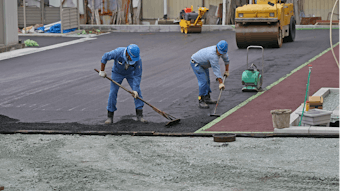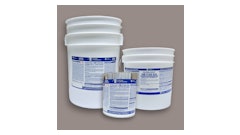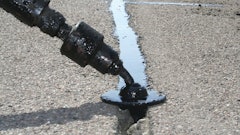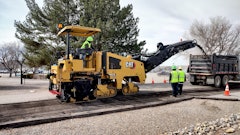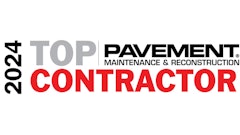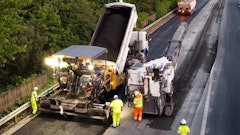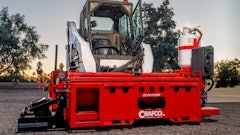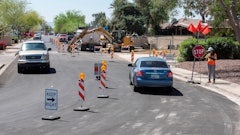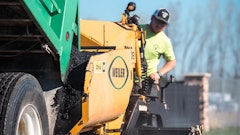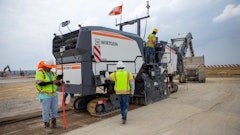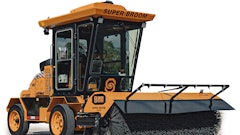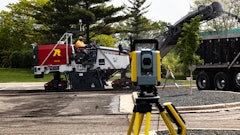If you're a sealcoating contractor and you're concerned about the future of the industry, you can relax say producers of sealcoating material. The sealcoating industry is here to stay. What the industry will look like, or what materials will be used is open to discussion, but the industry is something you can bank on. And sealer producers say there are a number of reasons for that, including the success contractors have had educating their customers.
"This is a consumer-driven product and service. People see the need for it from a maintenance standpoint and from an appearance standpoint," says Rob Vance, vice president of sales for Vance Brothers Inc., which started producing refined coal tar sealer in the early 1970s and an asphalt-based sealer in the 1980s. "So there's always going to be a desire on the part of the consumer for some type of demand for some type of pavement sealer."
Vance adds that the type of sealer might have an impact on the extent of sealcoating, but the demand will still drive sales. "There will always be some sort of sealcoating industry, and to some extent it depends how this coal tar thing ends up what that industry will look like," Vance says.
He says that if the industry is forced to rely on materials other than refined coal tar or asphalt-based sealers the cost of sealcoating could rise, and if cost to consumer rises customers might limit the areas they sealcoat, "possibly just for drive lanes and driveways or high-traffic areas."
"In 20 years will all sealers be acrylic based? Could be," Vance says. "But asphalt pavement is such a big part of our life - just look around as you drive anywhere - and that's not going to go away."
Lee Lowis, whose company Surface Coatings Co. began producing sealer in 1975, agrees. "I don't see it changing drastically unless environmental issues for both asphalt and coal tar force it to," Lowis says.
And that leads The Brewer Co.'s Bill Maclean to term the industry "stable." With a start in the pavement business dating to 1933, Maclean says The Brewer Company knows a little about the industry's longevity and has produced products specifically for maintaining pavement since 1953.
"The industry is still stable in comparison to many other industries," he says. "Asphalt paving is widely in use and competes very well with other pavement types so the need to maintain asphalt pavement is likely to remain stable as well."
Maclean says he hopes that a change the industry sees in the near term is more people selling the idea of sustainability. "All of these products and services (sealcoating, patching, crackfilling, and striping) add to the investment people have already made in their pavement, and that's the best way to market it," he says. "It makes the pavement look better and last longer, and those things provide value to the owner. The real answer to the green question, though, is that what we do is all about sustainability: we preserve existing pavement so that the material resources used to produce it aren't disposed of and the costs for producing it again aren't needlessly duplicated."
A Mature Industry
But more than stable, sealer producers constantly refer to the industry as "mature."
"From then to now it's a much more mature market," Vance says. "You can see that at the National Pavement Expo compared to what you would see when Harold Neal was doing his event in Atlanta [in the early 1980s]. Today you have better equipment on the floor and you have fewer and fewer smaller contractors doing it. It was a good business to get into and it's still good, but we don't see as many start ups as we used to."
Maclean agrees that especially from the standpoint of equipment manufacturers and sealer producers, the industry is maturing. "There's less innovation, by necessity not by intent," he says. "All the easy questions got answered a long time ago."
Maclean says that 25 years ago, for example, contractors looking to buy equipment had much less to choose from. "Contractors looked to equipment manufacturers to help them become more productive and some designs did so a heck of a lot better than others," he says. "There are more and better choices today."
And even though manufacturers consider sealcoating a mature industry, they agree there's always room for new people and new businesses.
"Just as with any industry there's always room and a place for small and mid-sized businesses, they're just not as prevalent as they used to be," Vance says. "Most contractors today are established and they've got a good hold on their little region. Fifteen or 20 years ago you'd go to an NPE show and there would be tons of 'mom and pops' and father and sons companies there, and that's not the case anymore."
Lowis agrees the industry is mature but says that in the Surface Coatings market that hasn't stopped people from starting up a sealcoating business. "It's interesting that we get one or two people every year in our market who come in, want to start up, and think they can do it better than the guys who are already out there," Lowis says. "So there's still room for that, but on the whole it's a very mature industry."
He adds that the industry is getting younger, which also points maturity. "The last five or 10 years we've seen more young people getting into it, and I was wondering whether that was ever going to happen," Lowis says. "It's good to see young people who are energetic and enthusiastic getting into it. New companies can bring a fresh perspective."
Lowis adds that a significant change many sealcoating contractors have made is adding paving or large-scale repairs to their services. "It used to be the door of entry into the market was sealcoating, but people now looking at the business are looking to enter the pavement maintenance industry instead of just the sealcoating industry. That's a great opportunity for manufacturers and dealers who today produce and sell a lot more crack filler and other products than we did 20 years ago."
Producers Ramp-up R&D
One of the points each manufacturer emphasized is their increased emphasis on research and development of new materials.
"We ramped up our R&D in 2006 and add to that commitment each year," Maclean says. "It's something we feel, based on our experience in 2006 [when the industry experienced a coal tar shortage] that we had to do. We feel it would be irresponsible to not make a significant investment in R&D; and what we have under evaluation today, both in quantity and quality, far exceeds what we had then."
Vance says Vance Brothers has worked on developing different sealcoating products for years. "But for the last four or five years in particular that's been a big explosion in our company, the R&D side. We're constantly looking and prodding and tweaking our products, whether they are asphalt, polymerized emulsion, refined coal tar etc.," Vance says. "R&D is a bigger part of our company, and we realize it needs to be. We have to have products that compete with the other products out there, and that means more R&D.
"That's another sign of a maturing industry, high-engineered products - the new stuff," Vance says. "People are always looking to have something bigger, better, stronger, faster and that really dovetails with the maturation of the industry."
Maclean says that R&D involves more than just finding a material that can be used to seal pavement. He says the new material must be durable, it must be inexpensive, and it must be something a producer can make a lot of quickly."Every year people come to see us with new and different resins but finding one that performs similarly to coal tar is still elusive. There are acrylics that make a very tough coating, but they are expensive."

